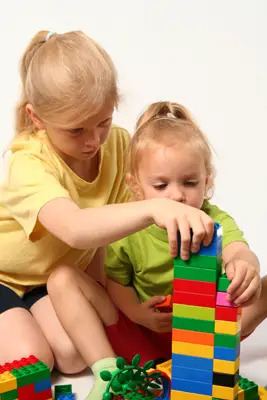Brothers and sisters of kids with special needs have their own set of needs – an important fact for parents to address in order to raise a healthy family. Here, two New York City families tell their story, and experts in the field share their insights and advice.

From a very early age, eight-year-old Drew Beasley sensed that his brother was different from other children. He was right.
His brother Jack, 13, is hearing impaired, has a speech and language disorder, ADHD, and a muscular disorder. He is slow to speak and has a hard time forming words. To counteract the muscle disorder, he wears leg braces, but he still has problems with simple tasks like opening water bottles with twist-off tops.
“Drew has always been keenly aware that Jack struggles with many things, but he takes it very much in stride by assisting Jack with a task and moving on,” says Suzanne Peters, the boys’ mother. “Drew often says, ‘Some people communicate with their mouths, some don’t. Some people walk with their legs, some don’t. We are all different.’ “
Drew is also fiercely protective of his older brother and, especially recently, has struggled with knowing that other children and even some adults make fun of Jack’s disabilities. When someone bullies, teases, or makes fun of Jack, Drew becomes withdrawn, sad, and introspective. His parents have tried to turn each encounter into a life lesson, such as discussing how an adult who draws attention to Jack’s disabilities might simply be having a bad day.
“Sometimes, I worry that Drew grew up too fast,” says Peters, who raises her children on the Upper West Side. “He has a maturity about him that is unusual for eight-year-old boys; however, he also possesses a patient and empathetic nature.”
Irene Belaga, Ph.D., a New York City psychologist, says this is normal. Siblings of children with special needs who adapt well to the situation are often more patient, accepting, compassionate, and helpful than their peers. They are also more likely to be supportive, empathetic, dependable, and loyal.
Adapting to the disability, however, can be difficult. That was the case for Bridget Petrie and her children, who live in Brooklyn. Shawn, the youngest of three children, has autism. His brother, who is 16, has adapted well. He researches the disease and tries to understand it as much as possible. His sister, Alexandra, has struggled a little more.
Her reaction isn’t uncommon. Many children experience conflicting feelings throughout their lives because of their relationship with a special needs sibling. They may feel worried about their sibling; jealous of the attention their sibling receives; scared they will lose their sibling; resentful of having to explain, support or take care of their sibling; pressured to be or do what their sibling cannot; and guilty for negative feelings or for not having the same problems.
| “Siblings of children with special needs are more likely to be supportive, empathetic, dependable, and loyal.” |
In the early stages, Alexandra’s parents were consumed with finding the best treatment possible and setting up a schedule of therapy and medical appointments for Shawn.
“Siblings of special needs children may feel ignored by parents, given the extra time required to care for the special needs child,” Belaga says. “Siblings may also feel insecure and guilty about their feelings – anger, jealousy and hatred – towards their sibling.”
Even now, the disease is complex and hard for Alexandra, age 8, to grasp. Recently, Shawn, who is 7, has had a hard time controlling his emotions. He often hits himself or bangs his head when he’s frustrated. If other people are nearby, he may lash out at them. His sister is often the one who gets the brunt of his anger.
“Alexandra just doesn’t understand it,” Petrie says. “She’ll say, ‘Why did Shawn hit me? Why is he hurting himself?’ It’s difficult to explain that he does that because he has a hard time using his words.”
When children face tough periods in their sibling relationship, Belaga encourages parents to organize creative tasks for them to enjoy together to strengthen their bond and promote empathy. Drew and Jack often bond over video games, which both boys excel at playing. Parents should make sure to spend alone time with each child and recognize the healthy child’s positive attributes, special interests and hobbies.
“Ultimately, what’s important is to develop an environment at school and in the home which promotes a clear understanding of the disability, distinctions between the needs and desires of the two siblings, and an open forum in which to explore insecurities and difficulties as they arise,” Belaga says.
Both families rely on sibling support groups at Aaron Academy and the Rebecca School, respectively, where Jack and Shawn are students. These groups allow siblings to talk about the difficulties they experience with those who are in the same situation. Social workers at the schools can also recommend individual therapists for siblings to work with.
“It’s a safe place for them to talk about their feelings, especially because several of the other children often feel guilty saying something to a parent,” Peters says. “We are so lucky to live in New York City with all the resources that are out there. Sometimes it’s a struggle, but as long as the community is open, we can make it work.”




















